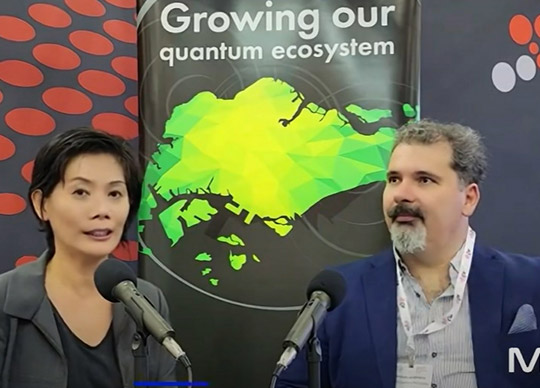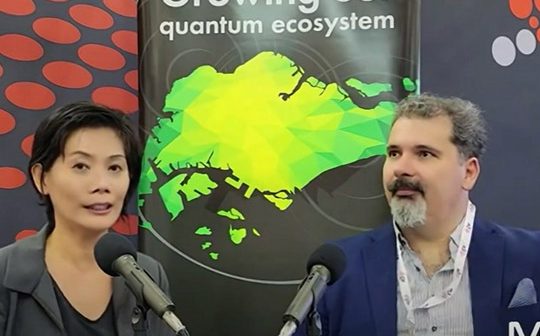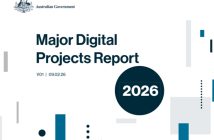
Jane Lo speaks with Dimitris Angelakis, Chief Scientist and Founder (AngelQ Quantum Computing), Principal Investigator, CQT (Centre for Quantum Technologies, Singapore).
AngelQ Quantum Computing is a quantum software and consulting company based in Singapore. AngelQ builds architecture-agnostic quantum and quantum inspired software solutions ready for company deployment. Example industries it works with are market and consumer research, finance, energy and sustainability, and supply chain.

Angelakis completed his PhD in quantum physics at Imperial College in 2002 and his thesis received the UK Institute of Physics Quantum Electronics Thesis Prize that year. Since then, he has been leading quantum computing research teams in Cambridge, Greece and Singapore. His research awards include the 2018 Google Quantum Innovation Award and the Valerie Myerscough Award from University of London.
Dimitris G. Angelakis joined CQT in 2009 as a Principal Investigator after being a regular visitor and collaborator of the quantum group since 2003. He was born and raised in a small farm in Chania, Crete, Greece, where his childhood curiosity for the wonders of nature led him to study physics in the University of Crete in Heraklion. In 1998 he was offered a PhD position in quantum optics to work with Sir Peter Knight FRS at Imperial College London supported by the Greek State Scholarship Foundation.
His PhD work in quantum light-matter interactions received the Valerie Myerscough prize in 2000, and also the Institute of Physics UK prize in 2002. In 2001 and at age 25 he was elected college research Fellow at University of Cambridge (St Catharine’s JRF) and worked in the Department of Applied Mathematics and Theoretical Physics until 2007.
A year after his move to Cambridge, the Centre for Quantum Computation in Cambridge was initiated by Artur Ekert, where he joined to work in implementations of quantum simulation and computation.
In 2008 he took over a faculty appointment at his hometown Technical University of Crete, where he in now a tenured associate professor of Quantum Physics at the School of Electrical and Computer Engineering (part time since 2012).
He is known among others for his pioneering work in quantum simulators using light-matter systems. He received the Google Quantum Innovation Prize in 2018.
In this interview, Dimitris introduces the trends of Quantum Technology, pointing to the developments in 3 rapidly emerging pillars – Quantum Computing, Quantum Networks, Quantum Devices.
Focusing on the area of Quantum Computing, Dimitris elaborates on how practical problems that require optimization, simulation and machine learning solutions would benefit from the speedup afforded by quantum technology.
Hence, for organisations to be “quantum ready”, Dimitris suggests a key first step for organisations is identifying where there are existing problems relying on optimization – such as routing and navigation.
In addition, Dimitris advises that transforming such problems to be “quantum ready” entails working with a quantum technology company to incorporate machine learning, and to co-design the quantum algorithms specific to the organisation’s problem.
Dimitris also stresses that quantum technology companies are working in partnerships with quantum hardware infrastructure providers to make quantum computing easily accessible to organisations via APIs. Such accessibility removes a major misconception that many have about quantum computing – that adoption requires acquiring specialized hardware.
With the disruptive nature of quantum technology, the need to be “quantum ready” is crucial. As such, Dimitris reminds organisations that performance and speedups goals are part of an overall journey that is foremost about learning – and in this, finding the right partner and quantum startup to work with, is one of the keys to success.
Recorded 7th June 2023, 2.30pm, Quantum Technology Summit (part of ATxSG), Singapore Expo.





